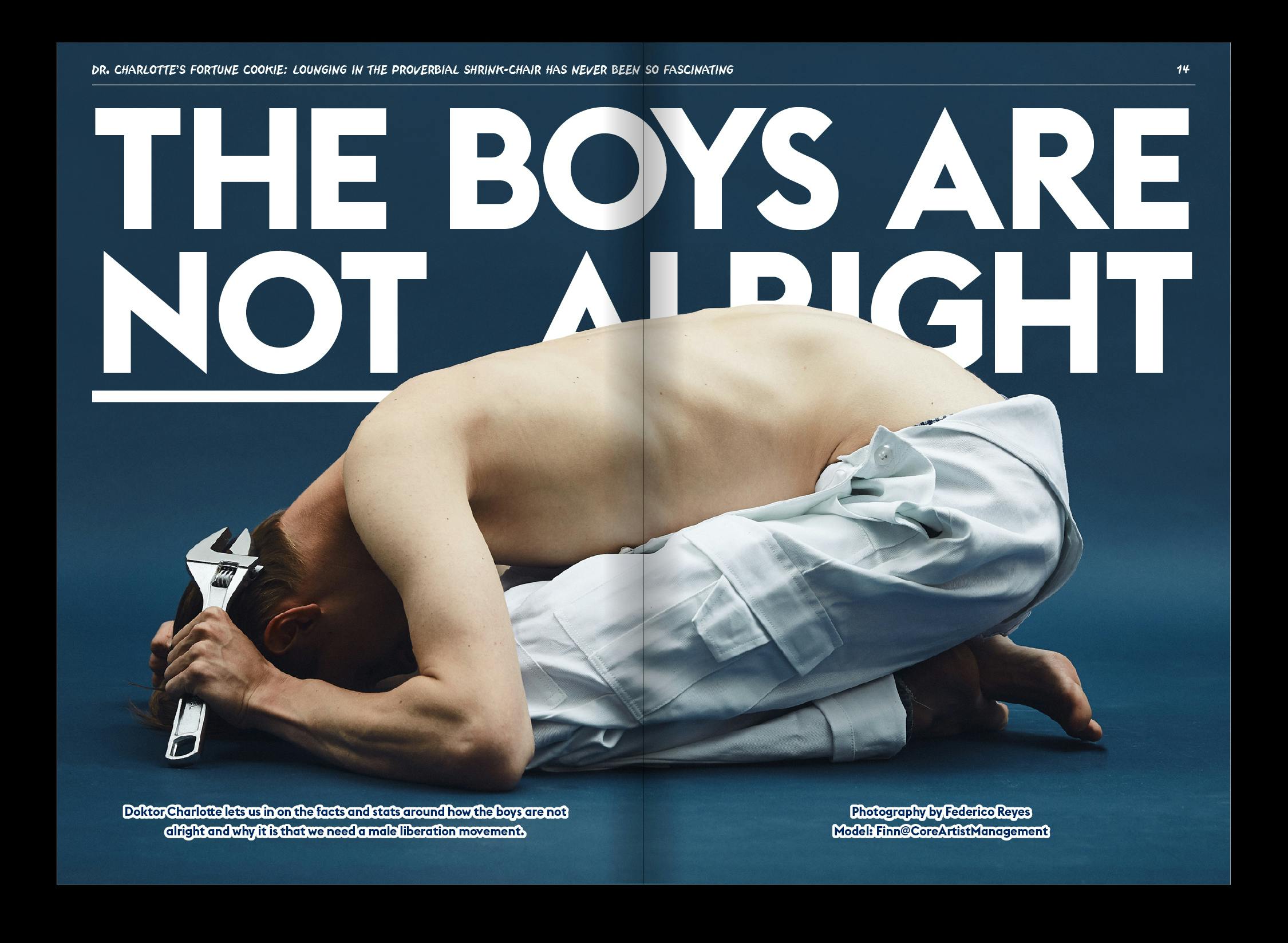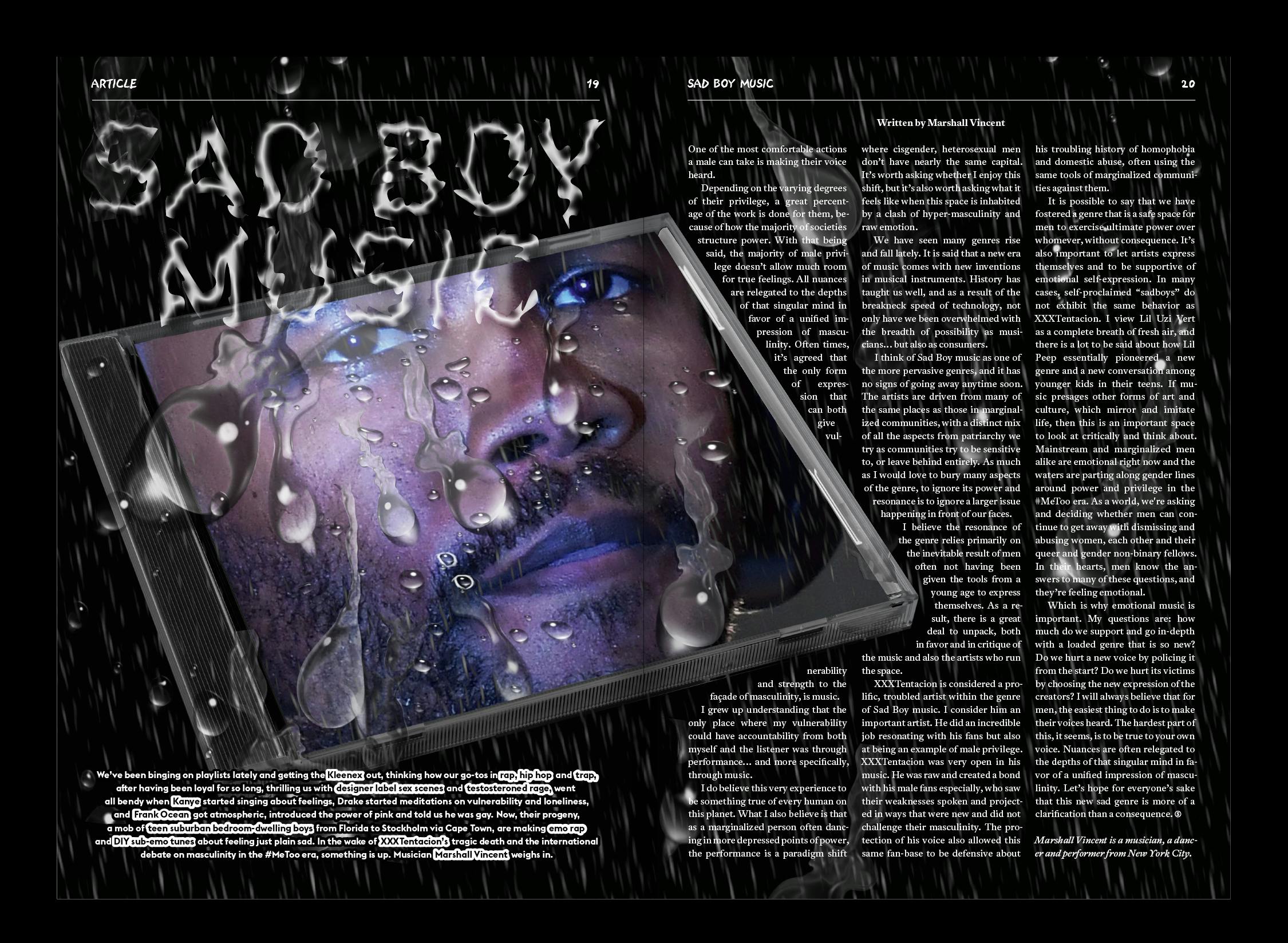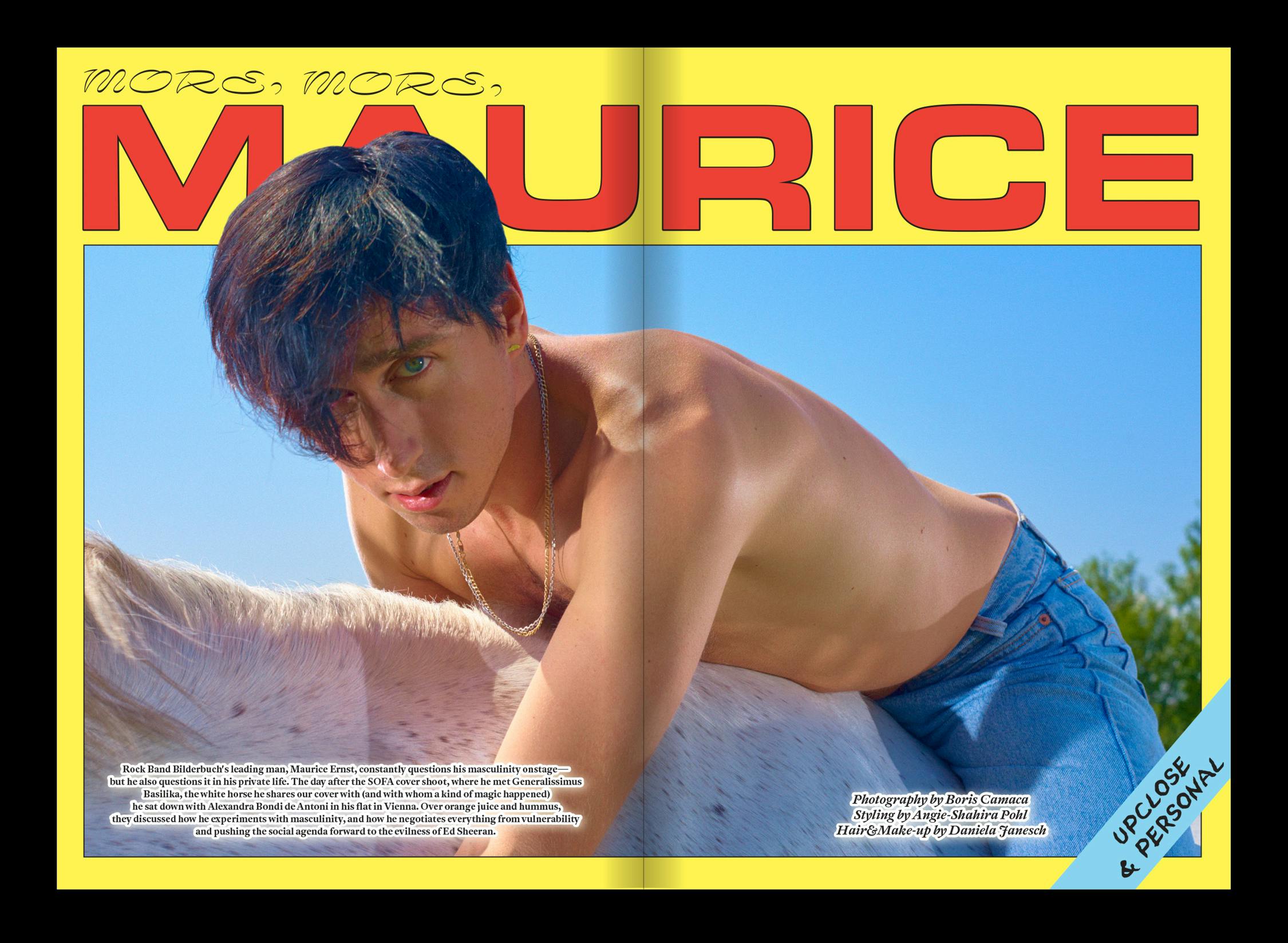Where have all the good men gone? Sofa magazine takes on masculinities

Sofa is a magazine as much about questions as it is about answers. Where its previous (brilliantly titled) “Cyberlove” issue focused on “the intersection between love and the digital space,” interrogating the complexities of intimate communication in the age of the online native, the “Masculinities” issue picks up where those conversations left off.
In Sofa’s third volume, editors Ricarda Messner and Caia Hagel aim to further close the imaginary gap between ‘online’ and ‘IRL’: in one instance they bring people together in person to drape them in Gucci and hash out questions about masculinity. In another they look to YouPorn to examine our ever-shifting relationships with pornography – perhaps the most complicated of digital/physical hybrids. They are, as Ricard and Caia put it, “dabbling in vices, taboos and dark culture alongside ‘high culture’ as a way to cross-pollinate realities.”
With all that in mind, veering between fashion, music, pornography and economics, never happy to focus on just one aspect of contemporary life, we asked Ricarda and Caia to talk us through the latest issue.
1. We invented the SOFA Mag Jam
The Mag Jam is a new magazine-making event concept newly installed in our third issue so we can gather a diverse group of our issue’s theme subjects, colonise a space, cook and compare pyjamas and sleepover, throw parties and host marathon-talks with the public, to map the moment & co-create the magazine’s content with and for its audience.
For Masculinities, we chose Andre, Kria, Marshall, Paul, Pierre and Timur, a cast of six guys (one transitioning as trans non-binary) from different cultural, sexual orientation, racial and socio-economic backgrounds, and over a long weekend in the Berlin countryside, they were asked to be vulnerable, tell their honest truths, ask confronting questions, host public conversations about some of the thornier topics facing boys & men right now and be open to arguments, talkback and tears. Three of these amazing talks were transcribed and re-enacted in the printed magazine; Boy Bodies/Dad Bods, #MeToo and You & Porn.
2. Magazines should be fearless in the ways that suit them, and add something worth lasting in the fast lane of contemporary information sharing
In this spirit we worked with YouPorn for this issue, after meeting Erin, their new PR & Marketing Coordinator, a girl who has strong visions for including ethical questions in porn making, distribution and dialogue.
Our SOFA manifesto includes dabbling in vices, taboos and dark culture alongside ‘high culture’ as a way to cross-pollinate realities, generations and aesthetic traditions. So this team-up lead to a few exciting things. First, that we coined ‘Popped Culture,’ a concept for engaging more formally with the digital diet we consume like crazy but don’t ever really consider artfully or with thoughtful critique.
In the preamble to You & Porn we looked at the definitions of culture, and pop culture, and defined Popped Culture as something more: “Porn, music videos, video games and social media are Popped Culture ‘performing arts’ that we consume all the time. We trust them as news sources, we crave them and are addicted to them, we are reflected in them, we respond to them and are impacted and even shaped by them. We interact with them more than with anything else—without us thinking they are culture and without us critiquing them as culture.” The You & Porn talk that followed revealed a lot of ‘secrets’ in a non-judgy way that are kind of a relief to read.
When we were editing, the Stormy Daniels Toad comment leaked from her upcoming tell-all biography about her life and times with Donald Trump. We were curious about how this might have played out in private spaces, so YouPorn sent us inside analytics on how porn ‘Toad’ searches broke the internet. We reprinted the numbers on a graph so readers can see porn’s capacity for impact and influence, and how deeply connected world events and porn consumption actually are.
YouPorn’s ads in the Masculinities issue are also graphically cool and are about promoting better sex and stopping revenge porn. What’s not to love?
3. Our cover featuring Austrian rockstar Maurice Ernst from Bilderbuch, is a spoof on the alpha Putin On Horseback trope, and was selected as a hot cover by Coverjunkie
Shot by French photographer Boris Camaca on location on a farm outside Vienna, the romantic setting and the soft focus, primary colour-blur of the imagery gives visual DNA to masculinity-in-transformation. The interview with the cover star by Alexandra Bondi de Antoni (who doppelgängs at the helm of vogue.de) lets us into the dreamy world of a leading man’s history with gender performance as well as his personal, behind-the-scenes struggles and beliefs.
4. SOFA goes a little gauche with fashion
We street cast non-models and they enact their real lives, which gives an almost more fantastical element to the storytelling than fantasy does right now. Our Masculinities fashion story in collaboration with Gucci features the diverse Mag Jam cast and was shot by Georgian fashion-documentary photographer George Nebieridze on location at our Mag Jam retreat.
As an eclectic group of males who work as DJs, musicians, poets and skater/filmmaker, and as an extension of the Mag Jam weekend with all its hair-raising activities, the cast bring a deeper appeal to the fashion story including the visceral vibes of globalism, youth culture, emotion and relatability.
Coupled with editorials like Cocksure, a treatise on the ‘phallus fallacy’ written by Sean Kennedy, a professor of English and former Vice-President of the Samuel Beckett Society, and Bodies Never Lie, a healing treatise for male trauma by biohacker Ryan Frisinger, fashion becomes almost profound, and intellect and wellness become allies that never were.
5. In every issue of SOFA we have an Observatory
Editors, Caia and Ricarda, armed with telescopes, internet statistics, litchi gummy bears and cherry sodas, analyse an emerging aspect of economics or politics first from a philosophical POV, then a mathematical POV. Here, Kylie Jenner’s ascent to potentially being the youngest billionaire of all time is analysed as a kind of oxytocin economic model beside the older testosterone model of Nike.
We invented the concept of Cyberhyperdrive™️ to describe it: “Cyberhyperdrive™️ defines a not-yet-fully-definable pink jungle space wherein the principles of plant, fungi and bacterial life are mimicked in contemporary female tech-fuelled culture and economics”. We won’t lie, we love invention 🙂











